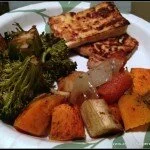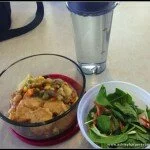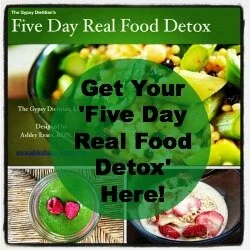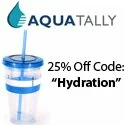Good morning! Happy Hump Day! A few weeks ago I was asked my thoughts on childhood vegetarianism and this happens to be a topic I am very passionate about. Now in the second half of my twenties, the question about when Dustin and I plan on having children comes up a lot. While the answer is no time soon, it’s still something to think about.
Dustin and I have agreed that we will raise our children vegetarian until they are old enough to make the decision for themselves. Because of this, I want to be WELL educated on providing my future children every single nutrient they need in order to properly grow, develop, and thrive.
Today’s post is to answer that question, “Can children adequately grow and develop if eating a vegetarian diet?”
The answer is yes. According to the Academy of Nutrition and Dietetics,
“appropriately planned vegetarian diets, including total vegetarian or vegan diets, are healthful, nutritionally adequate, and may provide health benefits in the prevention and treatment of certain diseases. Well-planned vegetarian diets are appropriate for individuals during all stages of the life cycle, including pregnancy, lactation, infancy, childhood, and adolescence, and for athletes.”
Appropriately planned is the keyword in that sentence. Hence, why I want to be well educated on this topic long before Dustin and I ever have children and raise them this way. As a vegan myself, I know I get adequate nutrition but I also know that adult needs and child needs aren’t the same.
So what are the key nutrients to look out for? Let’s take a look.
- Protein provided via: beans, grains nuts, nut butters, soy products (if you are including soy), dairy products (if you are including dairy), eggs (if you are including eggs)
- Vitamin D (which is actually a nutrient we should all watch out for) provided via: fortified products, mushrooms, sunlight, eggs, salmon
- Calcium provided via: green leafy veggies (broccoli, kale, bok choy), almonds, almond butter, fortified products, dairy products (if you are including dairy)
- Iron (combined with Vitamin C rich foods (citrus fruits, papaya,bell peppers, tomatoes) for better absorption) provided by: whole grains, dried fruits,beans, green leafy veggies, fortified products
- B12: nutritional yeast, fortitifed products, eggs (if your including eggs), dairy (if your including dairy)
- Zinc: whole grains, pumpkin seeds, wheat germ, nuts, beans, fortified products
If not anything, I hope this post further educates you on a vegetarian diet and eases your mind if your child ever comes to you and tells you they are going to try out a vegetarian diet. Support them! Because as you can see, a vegetarian (or vegan) diet can be adequate for children with proper planning!
And always remember, a Registered Dietitian can help ensure that your or your child is receiving the nutrients that he/she needs. If you have any questions please don’t hesitate to ask!
Have a great Wednesday!
Good health!
















My children are vegetarian, although not vegan, and they have had no problems getting adequate nutrition. Thanks for the post Ashley!
That’s awesome to hear! I’m sure they are thriving!! Thanks for stopping by!!!
A exciting way to help children stay fit and healty with a variety of fun and exciting fitness and health
Comments on this entry are closed.